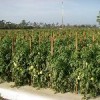 Even though drip irrigation is more efficient than the other irrigation methods, proper system management is crucial if that increased efficiency is going to result in water savings and a viable crop. One important aspect of drip irrigation management for crop success is irrigation scheduling, which includes determining both how much and when to irrigate. The grower can use several different methods to help develop a suitable irrigation schedule. Proper scheduling needs to be implemented to take full advantage of the increased drip irrigation efficiency. Two examples are presented in this 5-page fact sheet for tomatoes and peppers, which are two important vegetable crops in Florida, to demonstrate the use of reference evapotranspiration and crop coefficients in developing a drip irrigation schedule. Written by Sanjay Shukla, James M. Knowles, and Niroj K. Shrestha, and published by the UF Department of Agricultural and Biological Engineering, April 2014.
Even though drip irrigation is more efficient than the other irrigation methods, proper system management is crucial if that increased efficiency is going to result in water savings and a viable crop. One important aspect of drip irrigation management for crop success is irrigation scheduling, which includes determining both how much and when to irrigate. The grower can use several different methods to help develop a suitable irrigation schedule. Proper scheduling needs to be implemented to take full advantage of the increased drip irrigation efficiency. Two examples are presented in this 5-page fact sheet for tomatoes and peppers, which are two important vegetable crops in Florida, to demonstrate the use of reference evapotranspiration and crop coefficients in developing a drip irrigation schedule. Written by Sanjay Shukla, James M. Knowles, and Niroj K. Shrestha, and published by the UF Department of Agricultural and Biological Engineering, April 2014.
http://edis.ifas.ufl.edu/ae500
Tag: James M. Knowles
Cattle Fencing BMP Can Reduce Phosphorus Loads from Florida Ranches
 BMPs are an important tool in helping the state and individual landowners protect and enhance state’s waters. Given the water quality issues facing Lake Okeechobee and other sensitive water bodies, the importance of BMP implementation has increased since their official establishment as part of the FWRA. In order to ensure that BMPs are reducing nutrient loadings, on-farm research is needed to verify BMP effectiveness. A four-year study was conducted to evaluate the effectiveness of the cow/calf stream fencing BMP. The study concluded that the BMP did reduce the amount of P being discharged from the ranch. This BMP should continue to be included in the cow/calf BMP manual, and, hopefully, its widespread implementation will help the state in meeting its TMDLs. This 3-page fact sheet was written by Sanjay Shukla, Wendy D. Graham, Alan Hodges, and James M. Knowles, and published by the UF Department of Agricultural and Biological Engineering, May 2014.
BMPs are an important tool in helping the state and individual landowners protect and enhance state’s waters. Given the water quality issues facing Lake Okeechobee and other sensitive water bodies, the importance of BMP implementation has increased since their official establishment as part of the FWRA. In order to ensure that BMPs are reducing nutrient loadings, on-farm research is needed to verify BMP effectiveness. A four-year study was conducted to evaluate the effectiveness of the cow/calf stream fencing BMP. The study concluded that the BMP did reduce the amount of P being discharged from the ranch. This BMP should continue to be included in the cow/calf BMP manual, and, hopefully, its widespread implementation will help the state in meeting its TMDLs. This 3-page fact sheet was written by Sanjay Shukla, Wendy D. Graham, Alan Hodges, and James M. Knowles, and published by the UF Department of Agricultural and Biological Engineering, May 2014.
http://edis.ifas.ufl.edu/ae501